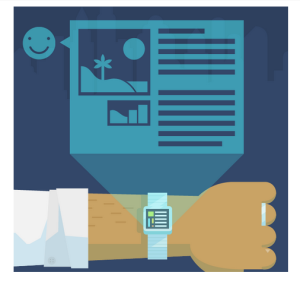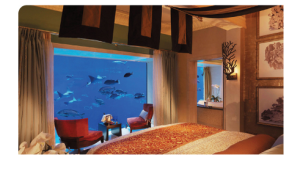Space Travel or Underwater Apartments: How Will Vacation Rentals Compete in 2024?
SkyScanner has completed its forecast for how travel will look in 2024. A sleek infographic with fantastic research and a bold foresight. We’re looking at its predictions and imagining how the future will look for vacation rentals.
It is convinced that the days of scouring the web for the perfect components of your trip are over. We will all have an individual ‘E-Agent’. A feature of our wearable AI (Artificial Intelligence) Device that is not only able to find each of your requirements but learn your taste as it searches and harvests. The report envisages a future where this technology will know when we want to book and suggest options without even being asked. The report envisages a future in which unsolicited lifestyle tips from your wristwatch will be welcomed, rather than seen as hideous and intrusive.This blog does not envisage such a future.

There are some predictions that seem, at best, far fetched. Space travel may not be a commercial viability for many years to come. Underwater hotels are also proving difficult to make the leap from concept to reality.

The section on transforming the airport experience also mostly reads like wishful thinking. At times straying more toward deluded advertisers trying to believe their own content about making airports anything more than an oppressive, commercial bear-trap.
In the near future, airports will be an intrinsic part of the holiday experience, a place that we enjoy spending time in. Airports will be about giving people a better sense of wellbeing during travel.
-NAH
‘Passenger spend will soar, and airport commercial areas will evolve’.
-YAH
A recurring point in the report is that guest information is going to be used to provide personal and individual experiences. Social profiles will be linked to companies, smart technology will be used to automate nearly everything. Searches will get more and accurate and tailored to every different person. It predicts soon technology will be able to analyse minute facial expressions when you view search results, evaluate your reactions and bring you more and more specific results. Imagine searching a site and the properties being returned in order of your personal taste. You could then confirm, book and pay with just one, secure voice-command. Wearable technology that has learnt the idiosyncrasies of your voice and sifts through the overload of search results means that trips can go from ideas to bookings in minutes.
Skyscanner’s Director of Hotels Nik Gupta says: ‘’2024, advances in digital technology will mean that travelers will have no need to encounter a single human being from the time that they enter their chosen hotel to the time that they check out of their room”.
Whilst this sounds just a little bit sad and dystopian, the point seems to be that the future of travel is focused on reducing the time spent planning and altering the smaller elements of our trips. If you can check-in during our transfer from the airport, then that is more time to enjoy your holiday. It’s not wrong to want to dedicate your time to your friends and family, but a part of travel is the interactions with others. Whilst greeting the concierge at the Four Seasons may not be fully immersing oneself in the culture of a place, cutting out the times we encounter others can’t help but feel like we are losing things rather than gaining them. This is where vacation rentals have an option. At present, they are seen as a more authentic or real experience than a large hotel. They are for the traveller, rather than the tourist. The question is whether this can compete with the increased ease and speed that big business will be able to offer.
Nik Gupta also says:
‘The fight back against peer-to-peer travel will see hotels empower their guests with incredible levels of hyper-personalization through their mobile devices to provide the unique experiences they want.’
Vacation rentals are in a strange hinterland here. If this prediction for the next 10 years is accurate, they need to decide where they stand. If they want to try to compete with the ‘hyper-personalization’ of hotel experiences or market themselves with the more particular and social style of the current peer-to-peer travel sector. The peer-peer market is set to continue growing, the report suggests that between 5-10% of the world’s population will be renting out space to travellers. This means that vacation rentals and peer-to-peer networks do not have to go into a straight fight with hotels and large chains. They will have a large enough market for themselves.
What seems evident is that there is going to be a widening gulf between the two. The hotel industry found itself caught a little unawares by the rapid expansion of both peer-to-peer rentals and established vacation rental businesses. They were being undercut by places offering greater space and comfort. Now hotels are using their greater resources to fight back and become more than just a bed for the night. Predictions include in-room 3-D printers, holographic personal trainers and ‘High-frequency sounds and chromotherapy deployed in bathrooms that will literally shake dirt off bodies with sound waves while soothing various pain points with color technology.’ The upcoming decade seems to herald the age of the unique experience, but as a later sentence explains: ‘The big problem scientists have is the effect these high-frequency sounds will have on the eardrums. They could blow them out.’ These unique experiences may not be quite ready yet.
The SkyScanner report suggests that the being the last person to do something will replace the cultural kudos of being the first.
‘Without any instructions from him, she begins to compile journey possibilities that she knows he’ll love. Perhaps a trip to see Africa’s disappearing elephant herds? ‘Only 20 years before they’re gone for good,’
If you ignore the almost gleeful tone, describing the destruction of an entire species as a great example of scarcity marketing, then there is a point here. The widespread opportunities for travel have reduced the amount of trips that come with ‘bragging rights’ - the social currency of being the first to do something. The finite nature of our natural resources are being realised and people are eager to witness them before the opportunity is no longer afforded. This also links in with using tourism alongside conservation and the raising of awareness. These trips can provide much-needed money to conservation and research projects whilst the traveller can also use social media to depict and share their passion.
The role of social media is also not to be underestimated. Experiences are now a public commodity and status symbol. And as sort of heartbreaking as it is, people are going to semi-consciously consider the social resonance of their trip as part of the booking process. How many Likes will a picture of another tired sunset over the Grand Canyon get when it is compared to a shot of the Moon rising over the curve of the Earth, taken from a hotel window, hanging in Inner-space? Or a video of the last blue whale grazing up against the glass in your underwater suite?
Whatever technology from these predictions actually makes it into the mainstream is anyone’s guess. What seems clear is that travel is set to change drastically. In a generation we have seen air travel change from a giddy, novel thrill into a tedious necessity. No-one is impressed by a overpriced mini bar or a Corby trouser press in their rooms anymore. SkyScanner´s report suggests that travellers want to be amazed again.
What vacation rentals will have to decide is if their property needs to try. You can read our debate on home automation and Smart technology here. In the age of underwater hotels and Virgin Galactic we are forgetting that a holiday is just a break from your routine, maybe somewhere new. Anything is work when you have to do it. Having to check in through your phone will soon be just as irritating as doing it now. The bar for tolerance is just getting lower. Reduce the amount the amount of things your guests have to do, don’t try to make these things easier.
But with all this there seems to be a big caveat left out. All of these amazing options are if you can afford them. Are we going to see a industry-wide shift towards this micro technology or will there be a divide? The exceedingly wealthy adopting this technology as the world muddles on fine without it. There is also another big question that the report ignores- will people be so quick to hand over this personal information about themselves? People may not want a hotel chain to know their shoe size, or evening drink preference. If not, then half of these systems will be obsolete. The report paints an nice image where everyone has worked together to iron out any inconvenience from the travel experience and give us trips full of unadulterated wonder and ease. But there is an ignored question of complicity from the traveller. Will we go along with this? And should vacation rentals try to follow suit? In these times of big data, would there not be an opportunity to just offer privacy and serenity? A option for an experience where people don’t know what you want at all time, or make everything contactless and easy- but allow you to try new things and experiences for yourself?
The advances in technology certainly are impressive. But can these touches really improve a holiday? Is controlling the thermostat and closing the electronic curtains from a tablet device really going to be anymore more than a briefly pleasing novelty before just becoming another chore? Are holidays and travel not better serviced by relaxation and adventure rather than gadgets or slightly less waiting time. Technology cannot manufacture experience in the way that it is seeking to.
The advocates of these advances in technology and the harvesting of Big Data or ‘Big Friendly Data’ -as the report subtly rebrands it - want to believe they can. They want a future where instead of a mini bar full of drinks you don’t like, you will be greeted by a knock. The campari and soda you usually like at this time on a Friday is here, delivered by an endangered Sumatran Orangutan.







